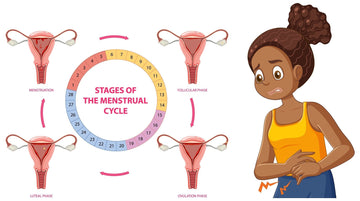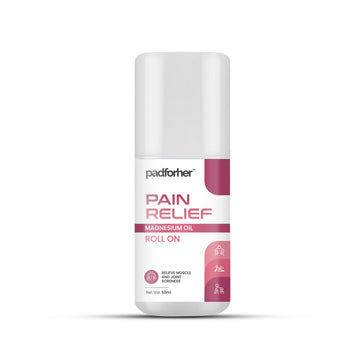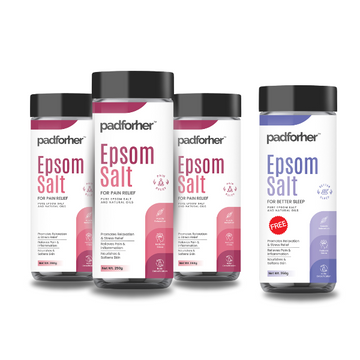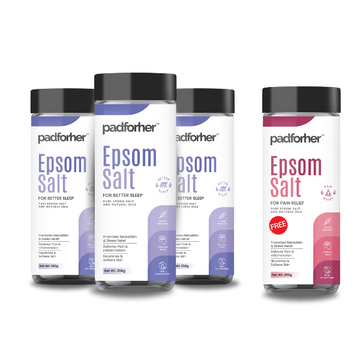Many women in India experience the dreaded “period pains” every month, also known as menstrual cramps. For some, it’s just a mild discomfort, but for others, these pains can disrupt daily life, causing missed school, workdays, or social activities. If you’re tired of painful cramps and wondering why they can be so intense, you’re not alone. In this post, we’ll explore why period pain happens and share some tried-and-true remedies to help you manage it better.
What Makes Period Cramps So Painful?
The Role of Prostaglandins
Period cramps happen because of a natural body chemical called prostaglandins. These are hormone-like compounds released by the body during your period to help the uterus contract and shed its lining. When prostaglandin levels are high, your uterus cramps more intensely, leading to more pain. This is often why some women feel sharp, almost stabbing pains, while others may only experience mild discomfort.
Primary vs. Secondary Causes of Period Pain
- Primary Period Pain: For many women, cramps are simply part of their monthly cycle, known as primary period pain. This type of pain is usually harmless, though it can be uncomfortable.
- Secondary Causes of Period Pain: Sometimes, more intense cramps can be a sign of underlying health issues like endometriosis or fibroids. These conditions can make period pain more severe, causing not just cramps but sometimes heavy bleeding, pelvic pain, or even pain between periods.
Conditions That Can Make Period Pain Worse
In some cases, intense period pain might signal conditions like:
- Endometriosis: Tissue similar to the uterus lining grows outside the uterus, causing painful periods.
- Fibroids: These are non-cancerous growths in the uterus that can make cramps more painful.
Factors That Can Worsen Period Pain
Lifestyle Factors
- Diet: High-fat, sugary, or processed foods can increase inflammation, worsening cramps. A balanced diet, on the other hand, can help reduce pain.
- Stress: In our busy lives, stress is often a constant companion, and it can make period pain worse by increasing tension in the body.
- Lack of Physical Activity: While you may not feel like exercising during your period, staying physically active can help prevent muscle tension and improve blood flow, which can ease pain.
Age and Menstrual History
Teenagers and young women in their early reproductive years often experience more intense cramps, as prostaglandin levels tend to be higher during these years. However, with time, the body may adjust, and cramps may naturally lessen.
Effective Solutions for Managing Period Cramps
1. Heat Therapy
One of the oldest and simplest remedies for period cramps, heat can help relax the muscles around your uterus, reducing pain. Here are a few ways to try it:
- Heating Pads: Use a heating pad on your lower abdomen for 10-15 minutes for instant relief.
- Hot Water Bottle: A favourite among Indian families, a hot water bottle works similarly to a heating pad.
- Warm Compresses: Warm compresses can provide relief, especially if you’re on the go.
2. Pain Relief Medications
Over-the-counter pain relievers like ibuprofen and naproxen are effective for period cramps, as they reduce prostaglandin production. These medicines can be found in most pharmacies, but it’s always a good idea to check with a doctor if you need them frequently.
3. Diet for Period Pain Relief
Your food might greatly affect how you feel during your period. Foods high in omega-3 fatty acids, fibre, and antioxidants can help lower inflammation. Here are some dieting tips:
- Omega-3-rich foods: Foods like fish, walnuts, and chia seeds can reduce inflammation, easing pain.
- Green Leafy Vegetables: Spinach, kale, and other leafy greens provide essential vitamins and minerals.
- Avoid Caffeine, Sugar, and Salt: These can increase bloating and worsen cramps. Try to stick to balanced, natural foods.
4. Gentle Exercise and Movement
Exercise may be the last thing you feel like doing during your period, but gentle movement can help. Physical activity releases endorphins, which are natural painkillers. Here are some exercises to try:
- Walking: A short walk can increase blood circulation and ease muscle tension.
- Yoga and Stretching: Poses like the child’s pose and gentle stretching can help relieve cramps naturally.
- Light Cardio: If you’re up for it, low-intensity cardio can reduce bloating and boost your mood.
5. Magnesium Products for Pain Relief
Magnesium is a powerful mineral that’s known for its muscle-relaxing effects, making it an excellent option for reducing cramps. Here’s how to incorporate magnesium into your period pain relief plan:
- Magnesium Supplements: Magnesium supplements can aid with muscular relaxation and sleep quality, both of which are important during your period. Always consult a healthcare expert for the proper dosage.
- Magnesium Oil Spray: Applying magnesium oil topically on the lower abdomen or legs can quickly target cramps and pain points, as it absorbs directly through the skin. Many people find this method convenient and effective for fast relief.
- Magnesium-Rich Foods: Include foods high in magnesium, such as bananas, almonds, dark chocolate, and spinach, to help your body handle cramps naturally.
6. Stress Management Techniques
Managing stress can help reduce cramp intensity, as stress can increase your body’s sensitivity to pain. Try these techniques:
- Meditation and Deep Breathing: Even a few minutes of meditation or deep breathing each day can reduce stress.
- Progressive Muscle Relaxation: This technique involves tensing and relaxing various muscle groups to relieve tension.
- Listening to Music or Guided Relaxation: Sometimes, simply relaxing and listening to your favourite tunes can make a big difference.
When Should You See a Doctor?
While some period discomfort is normal, severe cramping or pain that interferes with daily activities may indicate that something else is going on. It is worth speaking with a healthcare provider if:
- Your cramps keep you from work, school, or daily activities.
- You experience pain between periods or have heavy, irregular bleeding.
- The pain gets worse over time or doesn’t improve with standard remedies.
A doctor can help identify the cause of severe period pain and recommend treatments, including medication or lifestyle adjustments, to help you manage it better.
Conclusion
Period cramps can feel overwhelming, but with the right approach, you can reduce the pain and feel more in control. From heat therapy and a balanced diet to light exercise and stress management, there are plenty of natural solutions to try. Remember, painful periods aren’t something you have to live with in silence—there are options to make your monthly cycle more comfortable.
Explore different remedies, and see what works best for you. And if cramps are still interfering with your life, don’t hesitate to consult a healthcare provider for personalized advice. Here’s to a more comfortable, pain-free period!
Padforher Pain Relief Essential Kit
Padforher Pain Relief Essential Kit
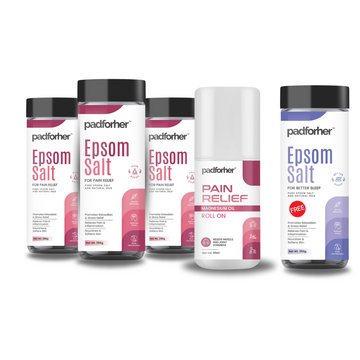
Blog posts
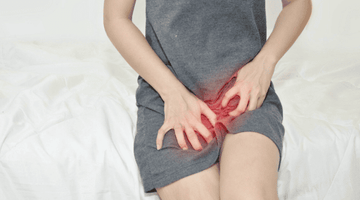
Undies and Infections!! Learn more today
Your underwear might be causing infections, rashes, and itches due to hidden factors like fabric...
Read more
Hello World: Introducing Padforher
Namaste! We're thrilled to introduce Padforher to the world of menstrual hygiene. As a brand...
Read more
Period Care and Planet Care: Making Eco-Friendly Choices
Have you ever stopped to think about the environmental impact of your period? For most...
Read more
Why Periods Need Good Hygiene: Simple Tips for Every Girl
Periods are a normal part of life, but good hygiene makes them easier and healthier!...
Read more